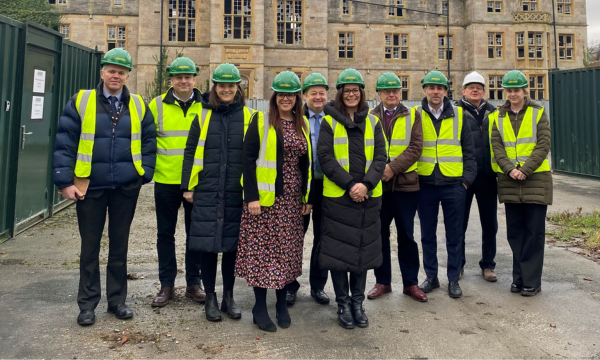 Opinion piece by:
Opinion piece by:
Pryderi ap Rhisiart,
Managing Director,
M-Sparc
Over six million people across the UK are in jobs today that will likely not exist by 2030. It may be seen as a threat for our region and young people but, it could also be an opportunity if we develop the right skills today.
The accelerated shift to a digital economy and advances in technology mean that many jobs will evolve dramatically or disappear altogether. As of 2019, 46% of jobs in Wales have high potential for change through automation and digitalisation.
It’s well documented that Covid has led to a transformation in how and where we work, it has forced us to learn new skills overnight. Although there are many different recovery forecasts, what’s clear is that the pandemic has accelerated the path towards digital transformation. Which may leave workers at risk of being left behind in the race towards a digital and greener labour market.
Experts tell us that ‘going digital’ isn’t just about keeping up with technology, it will be the difference between people achieving their potential by landing quality jobs and not having the skills employers and business need to thrive. For the economy as a whole, digital investment and digital adoption will drive growth and economic recovery in a post-Covid economy.
What does ‘digital skills’ mean?
Digital skills will mean very different things in different job and businesses. A doctor will need very different digital skills to an architect or a web designer. What’s becoming more apparent however, is that there is an increased digital element to the majority of jobs. These are not niche jobs occupied by specialist industries working in laboratories or rooms full of tech, but are in sectors such as health, construction, education, TV, agriculture and tourism.
In North Wales, what’s concerning is that these posts can’t always be filled and there is increasingly a skills mismatch within the region. Our region needs the knowledge and structures in place that can react to, and supply the demand for, digital labour in this fast-changing pace and new shape of the economy. It isn’t an issue which is exclusive to North Wales, the Learning and Work Institute reported that 1 in 4 UK companies had a significant digital skills gap in their workforce.
Inspiring Career Pathways
Faced with this situation, it’s vital that we start targeting young people from an early age – preparing them so that they are ready to enter the workplace with the right skills. The focus of education has been on literacy and numeracy skills for generations, which means we are now playing catch up on digital skills. It’s time that these skills were regarded as core if we want our young people to fulfil their potential.
We assume that young people know how important digital and tech skills are for their future careers, but research from Lloyds Bank and Ipsos MORI suggests that many don’t. Around 11.7 million people aged over 15 across the UK lack the ‘essential digital skills’ needed for day-to-day life online and have difficulty applying and transferring the digital skills they do to the workplace.
In 2018, there were 7,000 people employed in the specialist high-tech, computer programming, consultancy and related activities in North Wales. However, this number is expected to increase in a post-Covid economy following a shift where almost all employment roles will either become, or have already become, ‘digital’. Digital skills will become the necessary underlying skill set that underpins our regional, national and global economy, with a predicted growth for the industry of 6% from 2019 to 2023.
The World Economic Forum predicts that Artificial Intelligence will lead to an increase of 58 million jobs globally. They suggest that a good place to start is at school in computer science lessons – getting familiar with the basics of data science, machine learning and programming at an earlier age. ‘Normalising’ learning of digital skills is essential, as is ensuring current academic computer science subjects are relevant and connected to the reality of the workplace and industry. This remains a challenge but we are seeing encouraging signs that things are changing.
Attracting more women and girls
The challenges don’t end there. There are also stark gender inequalities when it comes to both ICT training and employment in the digital sector. Only 17% of the tech workforce is female. In 2020 across the UK only 11.5% of the A-level Computing students were girls and only 5% of the leadership positions in technology are held by women.
It seems that girls are often put off by tech or digital careers – so it’s up to us who work in digital, educational institutions and employers to make STEM subjects more accessible and appealing. In all other sectors we’ve seen how a fairer gender balance benefits business – this has to include digital and technology sectors too.
Positive action for the future
We’ve known about these issues in terms of digital skills for years – so what are we doing about it now?
The North Wales Economic Ambition Board (NWEAB) through the Growth Deal and linked projects is taking positive steps to tackling some of these pressing issues. By ensuring the right partners are on board and by putting infrastructure in place, developing the right skills is a priority across all growth sectors. So, it seems it’s not all doom and gloom, and the new education curriculum for Wales with a greater emphasis on STEM subjects will certainly play a part in ensuring the future looks brighter. Part of the Ambition Board’s vision, the Regional Skills Partnership (RSP) for North Wales is tasked with stepping up to the challenge of developing local digital skills through the ‘Digital Skills Employer Cluster Group’. These are local employers who are key in helping to identify current and future skills gaps across the region in high value IT and tech jobs. The groups are a platform for employers to voice concerns and issues with the aim to make the most of their knowledge and experience across a wide range of industries and to find innovative solutions.
The group is a team effort and members are driven by an approach that means it isn’t one size fits all in the quest to look for long term sustainable solutions to these challenges which face us.
Pryderi ap Rhisiart is Managing Director of Bangor University’s science park, M-Sparc and currently chairs the RSP Digital Skills Employer Cluster Group. He shares his vision for developing skills for the future and explains that he is determined to drive change which will mean that we have the right skills here in north Wales.
“There are opportunities out there which we must capitalise upon – for the benefit of the economy and post Covid recovery, but more importantly in order to secure brighter future for our young people. “




















